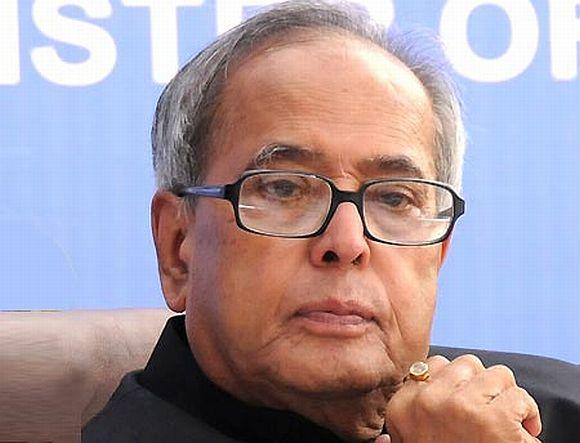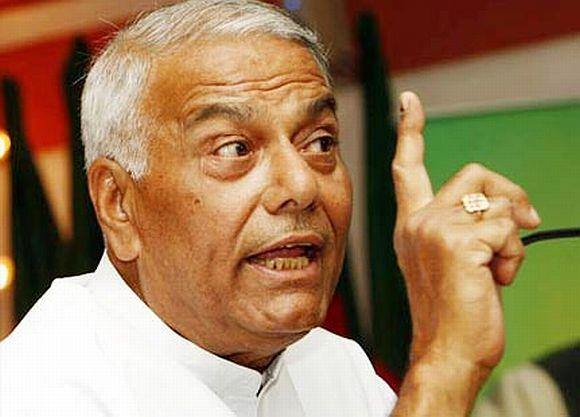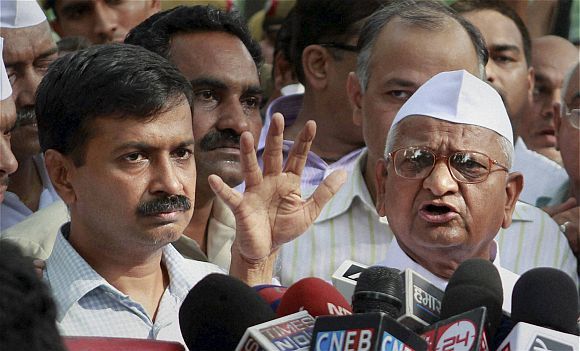A Correspondent in New Delhi
The new Lokpal and Lokayuktas Bill and a related Constitution Amendment Bill to grant the proposed ombudsman a constitutional status were introduced in the Lok Sabha on Thursday, withdrawing an earlier Lokpal Bill, after hours of wrangle and adjournment twice.
The bill now comes up for discussion in the Lok Sabha on Tuesday and possibly in the Rajya Sabha on Wednesday if cleared by the Lok Sabha.
Rashtriya Janata Dal supremo Lalu Prasad was in full form right from the time the House met, and backed by Samajwadi Party chief Mulayam Singh Yadav and Bahujan Samaj Party leader Dara Singh Chauhan, he forced the government to issue a most unusual 'errata' to include 'minorities' among the categories listed for reservation in the proposed 9-member Lokpal and Lokayuktas.
Finance Minister Pranab Mukherjee tried to respond to many speakers, and keeping Janata Dal-United leader Sharad Yadav on board, he assured that a Muslim will be accommodated in the category of the Other Backward Classes who will figure with Scheduled Castes, Scheduled Tribes and women for the reservation for the post of Lokpal.
Please ...
'Govt's inefficiency in hurrying with the bill with so many mistakes'
Image: BJP leader Yashwant Sinha slammed the government's 'hurry' to pass the Lokpal BillThey, however, did not agree to his stipulation and compelled the government to put the word 'minorities' in the list while correcting 46 errors in the circulated bill through a 'corrigendum.'
The government was, however, attacked by Bharatiya Janata Party's Yashwant Sinha and others for displaying its 'monumental inefficiency' in 'hurrying with the bill with so many mistakes'.
Leader of Opposition in Lok Sabha Sushma Swaraj sought to scuttle introduction of the bill on the ground that it was unconstitutional and patently illegal since it mandates the lokayukta in the states to go against the federal structure of the Constitution; and 'not less than 50 per cent' reservation of the Lokpal members goes against several Supreme Court rulings.
Mukherjee, however, stoutly denied any such deficiency and asserted that only legislative competence of the Parliament can be questioned at the stage of introduction.
'Don't surrender Parliament's sovereignty under duress'
Image: Left MPs charged that government was compromising Parliament's sovereignty by acting under duress (of Team Anna's impending agitation)Others, including Communist Party of India-Marxist leader Basudeb Acharia and Sharad Yadav, insisted that the Centre should not intrude into the domain of the state governments and better make it a model bill so far as the lokayukta is concerned.
The Shiv Sena backed Lalu Prasad to withdraw the bill and not hurry with a legislation of such importance without detailed discussion.
CPI leader Gurudas Dasgupta pleaded not to surrender the 'sovereignty of Parliament' under duress of the impending fast and 'jail bharo' agitation of Anna Hazare (without naming him).
Both the main bill and the related constitution amendment bill were finally admitted by a voice vote just after 5 pm, after Mukherjee made a spirited defence and assured the agitated members that all their concerns will be taken into account in effective implementation.
The entire lower bureaucracy is sought to be brought under the ambit of Lokpal and Lokayuktas who will hold preliminary inquiry and decide whether to order the probe by the Central Vigilance Commission or not, requiring the CVC to send back its report on Group 'A' and 'B' officers to the Lokpal, and take action against the other two categories of Group 'C' and 'D' on its own.
The prime minister has been brought under the Lokpal's ambit, but debarring it from holding any inquiry on allegations related to international relations, external and internal security, public order, atomic energy and space.
It also requires that the decision to initiate preliminary inquiry or investigation against the PM shall be taken by the full bench with a majority of 3/4th (7 of 9 members including chairman) and that such proceedings will be held in camera.
'Lokpal, Lokayuktas to have their own probe panels for preliminary investigation'
The Lokpal has been, however, given the right to file a case in the special court against the prime minister, a minister or a member of Parliament if the investigation findings show commission of an offence under the Prevention of Corruption Act. Identical power is proposed to the Lokayukta in case of the chief minister, ministers and members of the state legislatures.
The bill has a provision for superintendence of the Lokpal over the Central Bureau of Investigation in cases referred to it and also empowers the Lokpal and the lokayuktas to have their own inquiry panels for the preliminary inquiry and also an independent prosecution wing.
It also makes a provision that the CBI director hitherto appointed by the government would be appointed on the recommendation of a three-member committee of the PM, the leader of Opposition in Lok Sabha and the Chief Justice of India or a Supreme Court judge nominated by him.
Besides the public servants, which now include everyone from the prime minister to the peon as also ministers, MPs and those in the public sector banks and corporation and trusts or bodies wholly or partly financed by the government, the bill also brings under the jurisdiction of the Lokpal and the lokayuktas all entities and institutions receiving donations from foreign sources in excess of Rs 10 lakhs per year.
The Lokpal bill also makes it clear that no prior sanction shall be required from the government for conduct of CBI probe in cases entrusted by the Lokpal or for launch of prosecutions by or on the directions of the Lokpal and the lokayuktas.
It also lays down that any asset not declared by a public servant shall be presumed to be assets acquired by corrupt means and seized.
In case of appointment of the Lokpal chairman and members, the five-member selection committee will consist of the PM, Lok Sabha Speaker, Leader of Opposition in the Lok Sabha, Chief Justice of India or a Supreme Court judge appointed by him and an eminent jurist nominated by the President of India.
In case of the Lokayukta, it will be the chief minister, assembly speaker, leader of opposition in the state legislature, chief justice or the judge of the high court and an eminent jurist nominated by the governor. The bill mandates 50 per cent members of the Lokpal and lokayukta to be the judicial members.
How the Lokpal Bill puts a check on false complaints
Unlike provisions for removal of other constitutional authorities provided in the Constitution, the procedure for removal of Lokpal chairman and its members is provided in the main bill itself.
The President is sought to be empowered to make a reference to the Supreme Court on complaint against the Lokpal chairman or any member on a petition either signed by 100 MPs or by a citizen where the President is satisfied with the petition for reference and he may suspend the concerned chairman or member until he passes orders on receipt of report from the Supreme Court.
The bill provides for the Lokpal and the lokayuktas to have their own prosecution wings, while their inquiry wings will be limited to conduct the preliminary inquiry into complaint and then put the findings before the Lokpal or lokayukta for further inquiry by the competent institution like CBI, CVC, etc.
To put a check on false and frivolous or vexatious complaints, the bill provides for imprisonment up to one year and fine up to Rs 1 lakh and compensation to the public servant, in addition to the legal expenses he incurs for contesting the case.
The special courts to be constituted for trial of those found corrupt will also try such complainants.
The bill provides for confiscation of assets, proceeds, receipts and benefits arisen or procured by means of corruption by the Lokpal as well as the Lokayukta. They can make the provisional attachment of the assets and move the special court within 30 days to confirm the attachment of such property till completion of proceedings against the guilty public servant.
The property, along with benefits from it, will be restored back if the public servant is acquitted of the charges, but confiscated if convicted.






article